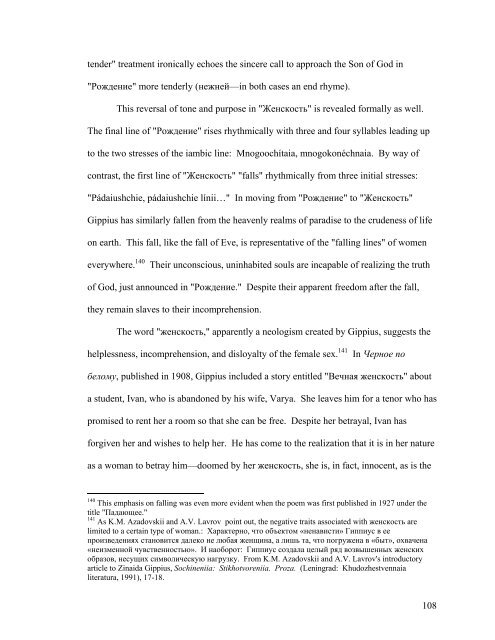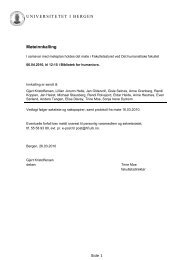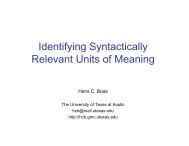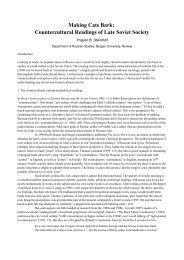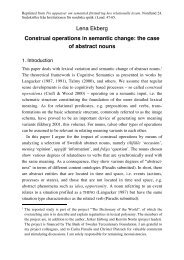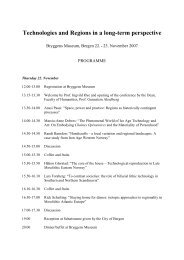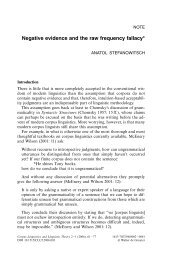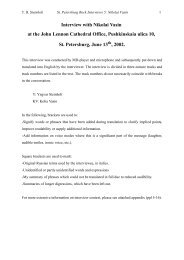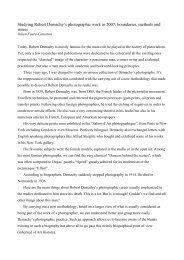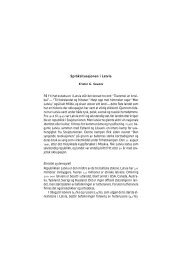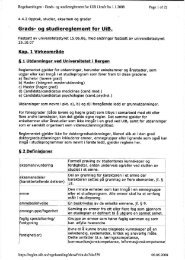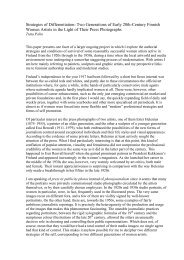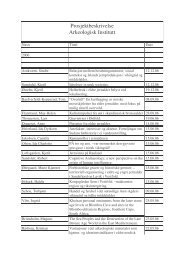THE BOOK OF POEMS IN TWENTIETH-CENTURY ... - TopReferat
THE BOOK OF POEMS IN TWENTIETH-CENTURY ... - TopReferat
THE BOOK OF POEMS IN TWENTIETH-CENTURY ... - TopReferat
Create successful ePaper yourself
Turn your PDF publications into a flip-book with our unique Google optimized e-Paper software.
tender" treatment ironically echoes the sincere call to approach the Son of God in<br />
"Рождение" more tenderly (нежней—in both cases an end rhyme).<br />
This reversal of tone and purpose in "Женскость" is revealed formally as well.<br />
The final line of "Рождение" rises rhythmically with three and four syllables leading up<br />
to the two stresses of the iambic line: Mnogoochítaia, mnogokonéchnaia. By way of<br />
contrast, the first line of "Женскость" "falls" rhythmically from three initial stresses:<br />
"Pádaiushchie, pádaiushchie línii…" In moving from "Рождение" to "Женскость"<br />
Gippius has similarly fallen from the heavenly realms of paradise to the crudeness of life<br />
on earth. This fall, like the fall of Eve, is representative of the "falling lines" of women<br />
everywhere. 140<br />
Their unconscious, uninhabited souls are incapable of realizing the truth<br />
of God, just announced in "Рождение." Despite their apparent freedom after the fall,<br />
they remain slaves to their incomprehension.<br />
The word "женскость," apparently a neologism created by Gippius, suggests the<br />
helplessness, incomprehension, and disloyalty of the female sex. 141<br />
In Черное по<br />
белому, published in 1908, Gippius included a story entitled "Вечная женскость" about<br />
a student, Ivan, who is abandoned by his wife, Varya. She leaves him for a tenor who has<br />
promised to rent her a room so that she can be free. Despite her betrayal, Ivan has<br />
forgiven her and wishes to help her. He has come to the realization that it is in her nature<br />
as a woman to betray him—doomed by her женскость, she is, in fact, innocent, as is the<br />
140 This emphasis on falling was even more evident when the poem was first published in 1927 under the<br />
title "Падающее."<br />
141 As K.M. Azadovskii and A.V. Lavrov point out, the negative traits associated with женскость are<br />
limited to a certain type of woman.: Характерно, что объектом «ненависти» Гиппиус в ее<br />
произведениях становится далеко не любая женщина, а лишь та, что погружена в «быт», охвачена<br />
«неизменной чувственностью». И наоборот: Гиппиус создала целый ряд возвышенных женских<br />
образов, несущих символическую нагрузку. From K.M. Azadovskii and A.V. Lavrov's introductory<br />
article to Zinaida Gippius, Sochineniia: Stikhotvoreniia. Proza. (Leningrad: Khudozhestvennaia<br />
literatura, 1991), 17-18.<br />
108


